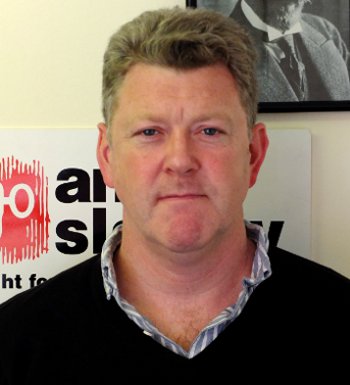UP TO 14,000 people are estimated to be enslaved in Britain today as the need for informal employment in unregulated sectors of the economy creates a hotbed for forced labour.
Those industries, such as construction, hospitality and domestic services, are where the highest risks of slave labour can be found, claims Dr Aidan McQuade, the Irishman at the head of the London-based Anti-Slavery International organisation.
“The places where you see slavery most prevalent in Britain are in the unregulated parts of the economy and places where there is a significant need for informal labour,” he told The Irish Post this week.
“So areas like domestic work in private homes, construction, which is not particularly well regulated, and catering and hospitality, which aren’t either. Those places are where there is a significant need for informal labour and where you see most of the risk emerging,” he added.
“The sex industry is another place where that is occurring,” he claimed, “but the sex industry is in fact in the minority. It’s only about 30 to 40 per cent of the overall set of issues of modern slavery.”
Dr McQuade, who hails from South Armagh, has been the Director of Anti-Slavery International - the oldest international human rights organisation in the world – since 2006.
Founded in 1839, with the support of iconic Irish nationalists Roger Casement and Daniel O’Connell, the organisation’s first success was in bringing an end to slavery within the British Empire.
The centuries that followed have seen it carry on that work internationally, while continuing to inform both the British and Irish governments on the modern guises of slavery and the best practices to deal with it.
This week Dr McQuade listened closely as Britain’s new Modern Slavery Bill was debated in the House of Lords, where it reached its report stage on Monday (February 23).
The Irishman and his team have contributed extensively to the Bill, which they believe could achieve real progress for victims of slavery in Britain - of which it is estimated there are currently between 10,000 and 14,000.
“There is more coverage of modern slavery these days but I think that is because there is an increase in awareness of it,” the human rights campaigner said.
“People have a clear understanding on what forced labour is, as opposed to the confusion around trafficking, and are identifying it more,” he explained.
“The estimate from the government in Britain talks about between 10,000 and 14,000 people being in forced labour, which is a lot of people and I suspect it’s been like that for quite a while.”
While Dr McQuade doesn’t feel that Britain is experiencing an increase in slavery cases, he does believe there is a need for better legislation to allow law enforcers to deal with the perpetrators of such offences.
“I think there is not a discreet answer to fix the problem once and for all, what you need is a process and different elements of the process being brought into place,” he explains.
“So you certainly need more law enforcement, but you also need some good laws in place which will take care of it. It’s difficult to see how the police will be able to investigate every case, given the police budget being cut so much, but then again you wouldn’t have to do as much investigation if you were to get the systems of safe migration in place, as opposed to the precarious ones which currently exist and which leave people vulnerable,” he adds.
“Because - and this is a rule not just for Britain, but for across the world - unsafe migration, which is often completely legal, can facilitate forced labour across the world.”
Dr McQuade is hopeful that the government will go some way to getting things right when the Modern Slavery Bill becomes law, which is expected to happen later this year.
Once passed, the new piece of legislation will consolidate current offences relating to trafficking and slavery to create two new civil orders to prevent modern slavery, establish an Anti-Slavery Commissioner and make provision for the protection of modern slavery victims in Britain.
For Dr McQuade those victims – both existing and potential – are as likely to be a migrant worker as a British native.
“The majority of people who are enslaved tend to be migrant workers from other parts of the world, but vulnerable British people can also be enslaved,” he warns.
“The key questions that one needs to ask regarding someone you think is at risk is how much they are being paid, is it under minimum wage, how much freedom of movement do they have, where are their travel documents - as often these have been confiscated, and is there any threat of violence?” he adds.
“Those are the areas which tend to illustrate if you are talking about a situation of forced labour. If you see one of those things, that should be a concern, but if you see two or more then you are probably talking about a situation of forced labour.”
Click here for further information about Anti-Slavery International
See the printed edition of The Irish Post - out today - for the full feature


